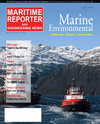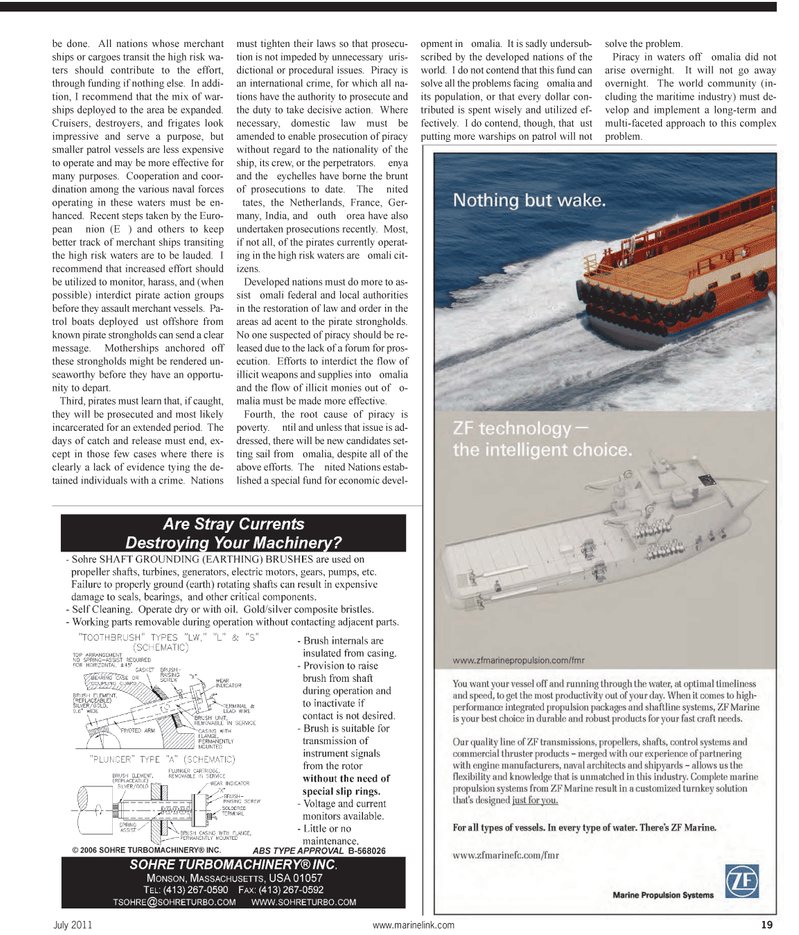
Page 19: of Maritime Reporter Magazine (July 2011)
The Green Ship Edition
Read this page in Pdf, Flash or Html5 edition of July 2011 Maritime Reporter Magazine
be done. All nations whose merchant ships or cargoes transit the high risk wa- ters should contribute to the effort, through funding if nothing else. In addi- tion, I recommend that the mix of war- ships deployed to the area be expanded. Cruisers, destroyers, and frigates look impressive and serve a purpose, but smaller patrol vessels are less expensive to operate and may be more effective for many purposes. Cooperation and coor- dination among the various naval forces operating in these waters must be en- hanced. Recent steps taken by the Euro- pean nion (E) and others to keep better track of merchant ships transitingthe high risk waters are to be lauded. I recommend that increased effort should be utilized to monitor, harass, and (when possible) interdict pirate action groupsbefore they assault merchant vessels. Pa- trol boats deployed ust offshore from known pirate strongholds can send a clear message. Motherships anchored off these strongholds might be rendered un-seaworthy before they have an opportu- nity to depart.Third, pirates must learn that, if caught,they will be prosecuted and most likely incarcerated for an extended period. The days of catch and release must end, ex- cept in those few cases where there is clearly a lack of evidence tying the de- tained individuals with a crime. Nations must tighten their laws so that prosecu- tion is not impeded by unnecessary uris- dictional or procedural issues. Piracy is an international crime, for which all na-tions have the authority to prosecute and the duty to take decisive action. Where necessary, domestic law must be amended to enable prosecution of piracy without regard to the nationality of the ship, its crew, or the perpetrators. enya and the eychelles have borne the brunt of prosecutions to date. The nited tates, the Netherlands, France, Ger- many, India, and outh orea have also undertaken prosecutions recently. Most, if not all, of the pirates currently operat- ing in the high risk waters are omali cit- izens. Developed nations must do more to as- sist omali federal and local authorities in the restoration of law and order in the areas adacent to the pirate strongholds. No one suspected of piracy should be re- leased due to the lack of a forum for pros-ecution. Efforts to interdict the flow of illicit weapons and supplies into omalia and the flow of illicit monies out of o- malia must be made more effective. Fourth, the root cause of piracy is poverty. ntil and unless that issue is ad- dressed, there will be new candidates set- ting sail from omalia, despite all of the above efforts. The nited Nations estab- lished a special fund for economic devel- opment in omalia. It is sadly undersub- scribed by the developed nations of the world. I do not contend that this fund can solve all the problems facing omalia and its population, or that every dollar con- tributed is spent wisely and utilized ef- fectively. I do contend, though, that ust putting more warships on patrol will not solve the problem. Piracy in waters off omalia did not arise overnight. It will not go away overnight. The world community (in- cluding the maritime industry) must de-velop and implement a long-term and multi-faceted approach to this complex problem. July 2011www.marinelink.com 19

 18
18

 20
20
